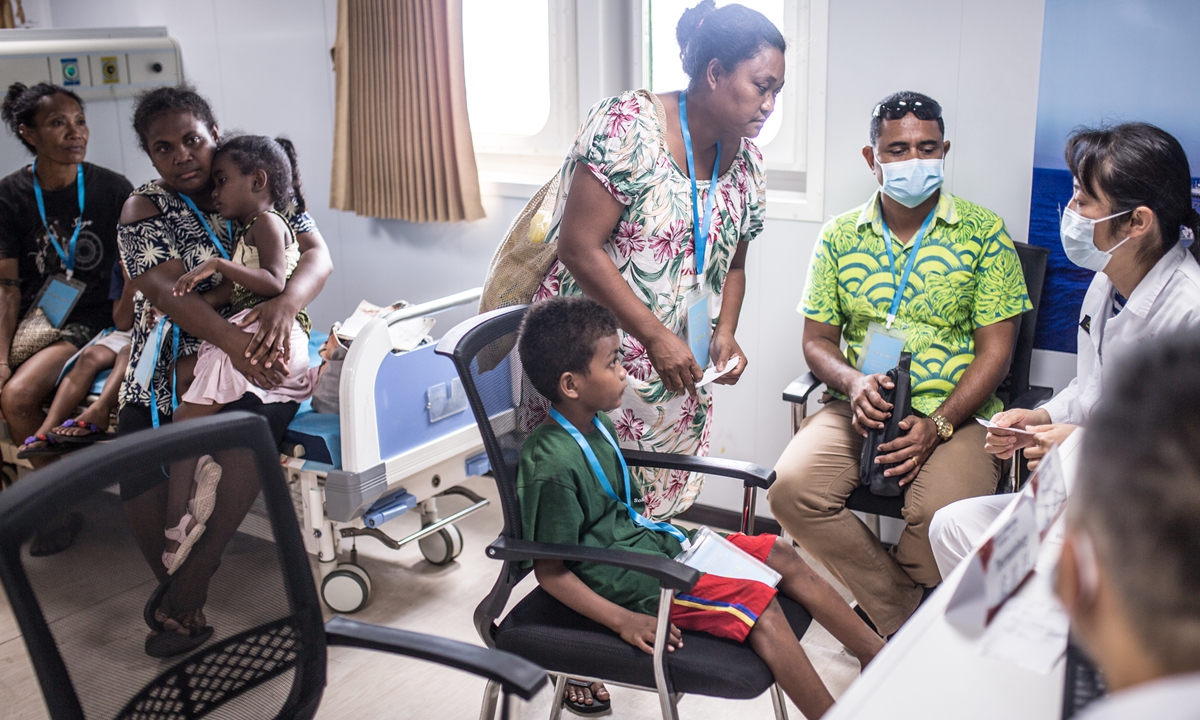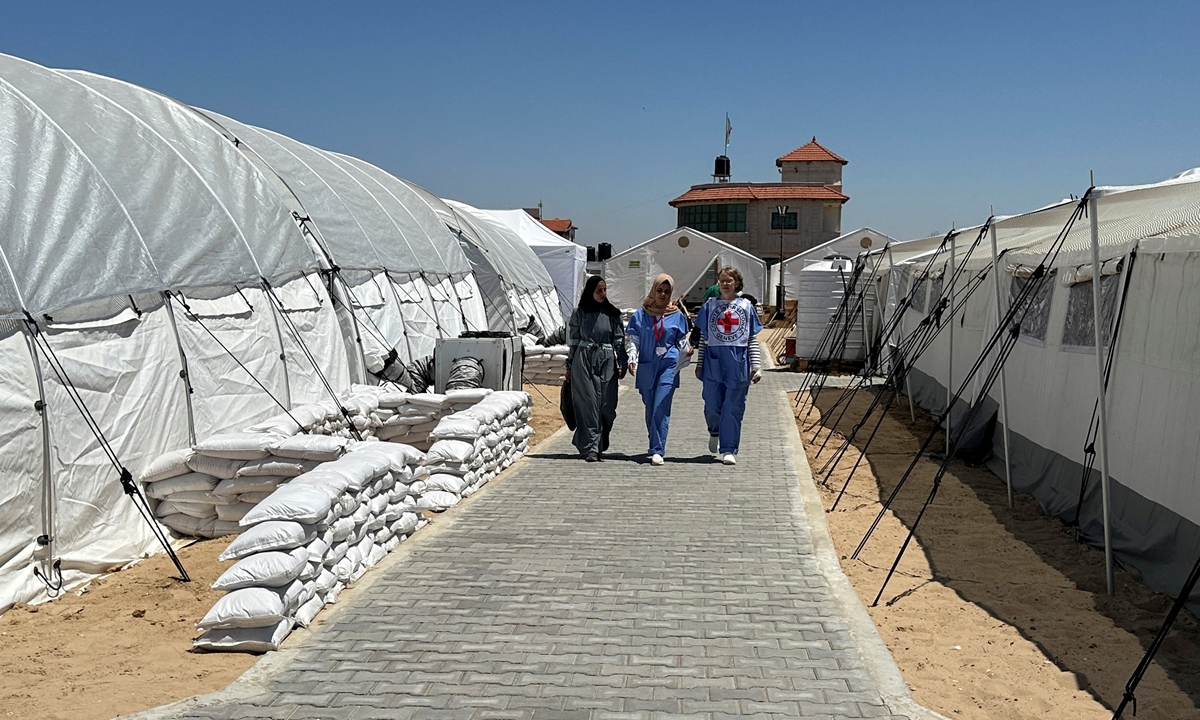IN-DEPTH / IN-DEPTH
China increasingly raising voice for international laws is of enormous value: ICRC regional head
Worthy peace partner

Residents of the Solomon Islands speak with Chinese doctors (in white) during a consultation aboard the Chinese Navy hospital ship Peace Ark in Honiara, Solomon Islands, in August 2023. Photo: Shan Jie/GT
Editor's Note:
This year marks the 75th anniversary of the Geneva Conventions. The collaboration between China and the International Committee of the Red Cross (ICRC) has become closer over the years as China has increasingly made efforts in the global humanitarian cause. In an exclusive interview with Global Times (GT) reporter Xie Wenting, Balthasar Staehelin (Staehelin), head of Regional Delegation for East Asia of the ICRC, said that China's commitment to advocating for international law is particularly significant as China's influence resonates not only within its borders but also beyond. He also hailed the initiatives that China has proposed to achieve stability through developmental approaches and the promotion of conflict resolution through dialogue. He expressed his hopes for further collaboration with China, particularly in leveraging technology to enhance humanitarian efforts.
GT: Could you provide an overview of the current humanitarian cooperation between the ICRC and China?
Staehelin: I think the relationship between the ICRC and China is a highly important and strategic one for our organization. It has seen a very positive, dynamic, and accelerated growth over the last year. When discussing the relationship between the ICRC and China, we must consider what is happening in Beijing, as well as in New York, and Geneva, where the ICRC headquarters is located. It is also important to take into account the dialogues that occur in embassies around the globe, where there are strong and productive exchanges.
Now, we are an organization mandated by the states, including China, to work in situations of armed conflict around the world to offer protection and assistance to people affected by conflict and to promote international humanitarian law. In a geopolitically divided world, it is of great value to have this dialogue that we have here in China and cooperation with a number of departments of the government and multilateral platforms. So we really try to engage with a number of actors and find solutions to humanitarian problems, and also to promote international humanitarian law. A very important relationship in China is the relationship that we have with the Red Cross Society of China.
GT: How do you assess China's contribution to the humanitarian cause on the global stage?
Staehelin: China is increasingly raising its voice strongly in favor of international laws. This is of enormous value to us, as China's voice is not only carefully listened to in China, but also across the world. We have seen this commitment in policy statements from China's Ministry of Foreign Affairs and other agencies of the government. This clear dedication to the importance of international law is crucial in a world where populations are suffering greatly from armed conflict. Respecting the rules of international law is of utmost importance. Therefore, China's political authority supporting international laws is very significant.
On the other hand, we also see China making operational contributions. We are very grateful for the support that we receive for our operations, both from the Ministry of Foreign Affairs and from the Red Cross Society of China, with whom we cooperate and who support operations that we lead in a number of very difficult regional hot spots and conflict situations.
And we also see the direct humanitarian actions that China lead through its medical teams, as well as the support it bilaterally offers to areas affected by armed violence and conflict to address their needs. This is an important contribution to addressing urgent needs. Lastly, there is a way of linking development efforts to restore peace, development, and stability, which is important in reducing the number of conflict situations and tensions.

The ICRC, in partnership with Red Cross societies and their affiliates in 11 countries, opens a field hospital in the conflict zone of southern Gaza, on May 16, 2024. Photo: IC
GT: What are the China-proposed projects or initiatives regarding humanitarian efforts that have impressed you the most?
Staehelin: What impresses me the most is the need to rethink how we can foster peace and stability. We are currently in a situation in which the number of armed conflicts is increasing sharply. We also have difficulty, I believe, in terms of international governance to really solve our conflicts in a number of contexts.
I have personally witnessed conflicts that have been ongoing for 30 to 40 years, and that poses a number of very acute problems. What is interesting, and I believe where China is in a unique position, is that China has a conceptual framework for policy that focuses on development as a contribution to fostering stability. It has put forward a number of initiatives, such as the Global Development Initiative, the Global Security Initiative and the Global Civilization Initiative.
I believe that thinking about how to foster development and stability can also be linked to what the ICRC tries to do in situations of humanitarian need and in situations of armed conflict, as well as to what international humanitarian law as a body of law tries to achieve.
I believe that these linkages need to be further developed in order to create new forms of cooperation and look for innovative solutions to overcome protracted cycles of conflicts that can last for decades. One interesting observation is the increasing involvement of China in mediation efforts for conflict prevention and resolution in various regions around the world. As part of our dialogue with the Chinese government, we also aim to enhance the ICRC's contribution by injecting new perspectives and elements into these efforts, which I believe will become increasingly important in the years to come.
GT: This year marks the 75 anniversary of the Geneva Conventions. How do you assess the significance of the conventions in today's world? What are the challenges to implement it?
Staehelin: I think we have truly realized, through our dialogue with states across the world and with non-state armed groups, that the Geneva Conventions are more important than ever. We are witnessing a proliferation of conflicts and a highly polarized public opinion. With over 120 conflicts [currently] occurring globally, it is evident that humanitarianism is a key consensus among different civilizations. As we mark the 75th anniversary of these conventions, it is crucial to acknowledge the need for a strong international consensus and the commitment of all states to uphold this law. This will ensure that a minimum level of humanity prevails in times of war.
Without these conventions, the suffering caused by unrestricted warfare would be unimaginable. The capacity for people to coexist and uphold a shared humanity would be severely compromised without these laws.
Despite the challenges faced by numerous norms, laws, and treaties, we must continue to uphold the consensus that these essential rules during armed conflict are a part of our shared humanity. The Geneva Conventions, established in the mid-19th century, codified these ancient and essential principles that civilians cannot be targeted, women cannot be subjected to rape, and medical facilities cannot be destroyed. It is imperative, after 75 years since the adoption of the Geneva Conventions in 1949, that we collectively strive for better adherence to these rules in all situations worldwide.
GT: You once worked in the Gaza Strip. Currently, there are other members of the ICRC operating in the region. Could you tell us what the latest situation in the Gaza Strip is? What are the challenges that the ICRC is currently facing?
Staehelin: I think that the situation in the Gaza Strip is hugely challenging. I have personally worked in Hebron in the West Bank and have been familiar with the situation for years in various capacities. It is an absolutely dramatic situation for the population. The suffering is polarizing the societies.
In such a situation, we try to be in dialogue with both sides and impress upon them the need to respect international law. We must act tangibly to bring assistance and help to the populations affected by the conflict. One tangible example of what we try to do is opening a field hospital to address the collapsing health system. This comes on top of a medical team that has been operating in the European Hospital in Gaza since October 2023. We aim to contribute to addressing the needs in the field of medical support for the population.
GT: In what ways do you think that China and the ICRC can further enhance cooperation?
Staehelin: China, in my view, can play a crucial role in helping us foster understanding and support for the humanitarian laws. We are also very much interested in learning from Chinese perspectives and new ideas on how to think and act in situations of conflict and fragility.
I believe that in the field of technology, there is huge potential as China is one of the leading countries in technology. We can explore how technology can be used for humanitarian action, as well as reflect on the impact of technology in war zones and find solutions that help us have a greater impact. With regard to the Chinese Red Cross Society, we already have a strong collaboration.
GT: You are an expert in technology. What are your plans in terms of cooperation with China in the technology field to facilitate humanitarian efforts?
Staehelin: I have been very interested in thinking about issues related to the responsible and ethical use of technology. I believe this will also be a key interest of my team to strengthen the connection and dialogue with tech companies and actors in China.
I have participated in discussions with tech companies and actors in China several times now. We are considering new solutions, such as a digital emblem. Just as we have a Red Cross emblem on houses and cars for protection, we believe that in the digital realm, we should have a similar emblem to mark assets that need to be protected by the law. This requires technical solutions, and we are eager to enhance our dialogue with Chinese tech actors to benefit from their knowledge and perspectives on what would be the best solution for a digital Red Cross emblem. We need the support of all states for this innovative thinking to be successful. Without the input of Chinese perspectives, we may not be able to find the most effective solutions possible.
On the one hand, technology can help reinforce our impact and internal action. But on the other hand, there are a number of issues on technology being used in warfare. I think, China, which has quite a strong position against the weaponization of cyberspace and has great concerns in that field, will be an important voice and an important thinking partner to consider the implications of evolving warfare and how we can ensure that international laws take effect.

